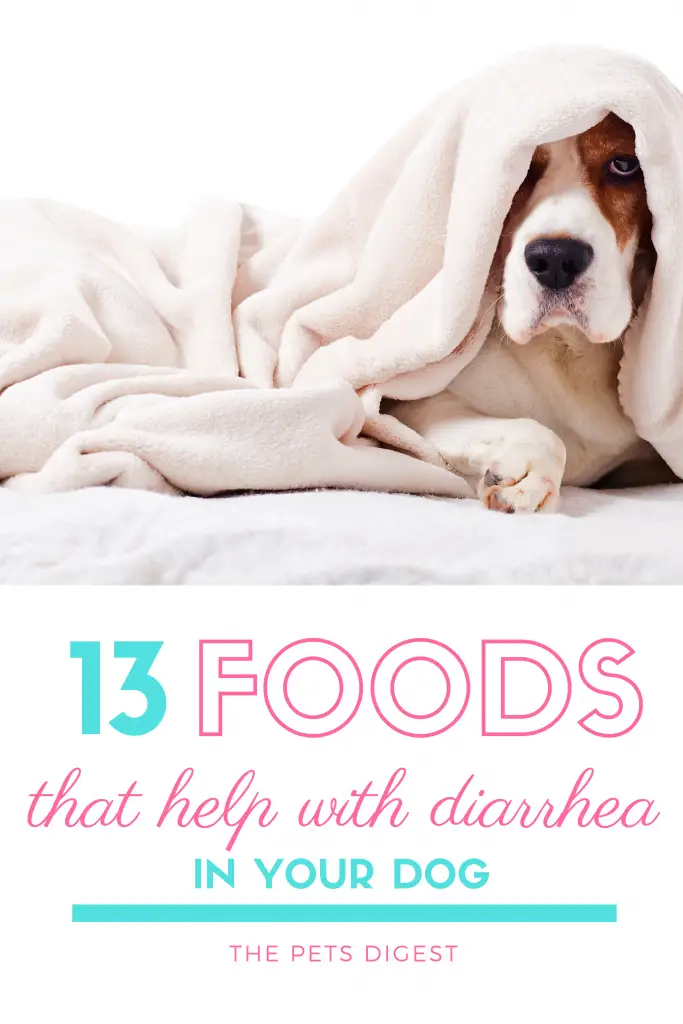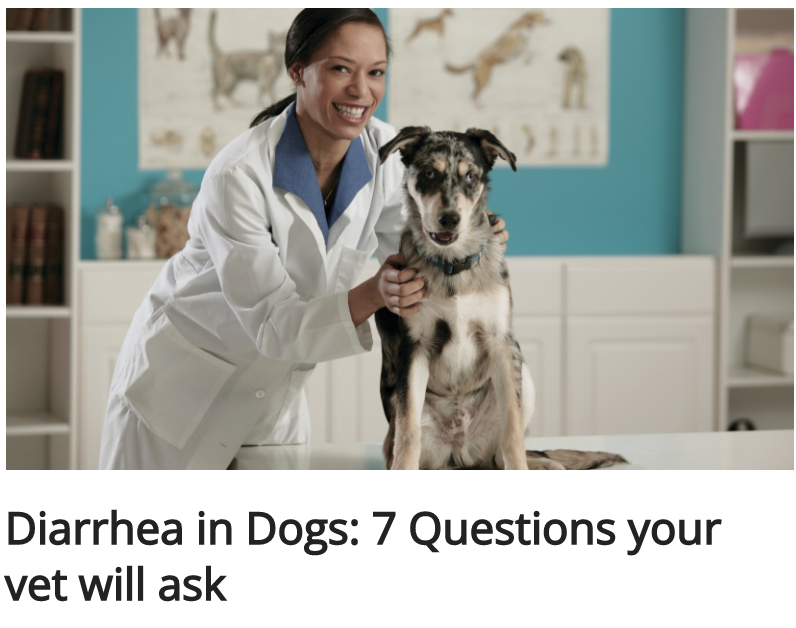If you own a dog and have not been woken up at 2 am by the rhythmic retching that is only preceded by you having to clean up vomit or diarrhea, don’t worry you will.
Upset stomach, nausea, and the consequences of both are some of the not-so-great joys of dog ownership.
Aside from food, there are also some over-the-counter medications that you can give your dog with your vet’s permission. Read about them here.

What to do when your dog has an upset stomach
As a veterinarian, one of the first things I would tell any pet owner is to fast your dog for at least 24 hours to give his or her stomach a much-needed rest.
After this period of time start with foods that are gentle for example chicken stock. Any type of bland diet (rice and boiled chicken breast) is usually my go-to introductory food.
Once your dog is out of the woods and over the initial bout of nausea they are probably ready to begin eating solid foods and these are some that may prove to be beneficial when added to his or her regular diet.
For more on what to do when your dog has an upset stomach read here.

One of the first things you should know is that a dog with diarrhea could have an issue as simple as eating something out of the garbage that didn’t agree with them or an issue as severe as pancreatitis.
If you want to learn about other common causes of diarrhea in dogs read this article.
This is why it is always recommended that you check with your veterinarian, especially with prolonged cases of diarrhea.
13 FOODS THAT HELP WITH UPSET STOMACH
The goal in feeding a dog with diarrhea is to ensure that they are receiving something nutritious that will help reinstate any lost electrolytes and minerals that were flushed away with diarrhea while not giving them anything too heavy or flavored (think bland – like white rice).
One of the best things you can give them is bone broth and something like plain Pedialyte or This diarrhea-relief dog food topper. Boiled white rice is also a great way to get something fairly bland on their stomachs after a bout with diarrhea.
If you’re looking for a great recipe for bone broth click here for the recipe.
The list below is great to help with firming up bowels after you have cleared with your veterinarian that there is nothing serious causing your pup’s diarrhea.

13. Psyllium

Psyllium is also known as Metamucil and although it is marketed as a bulk-forming fiber laxative it can also help with diarrhea.
It works by absorbing liquid and swelling in the intestines to create bulkier stool which is easily passed.
The fiber in Metamucil helps with diarrhea, by firming up the stool. For some, it has worked wonders in their dog with IBD by keeping their bowel movements regular and it has also been known to help with recurring anal gland problems.
The increased bulk stool puts more pressure on the glands to express themselves.
It works much in the same way that pumpkin does and while it may not be your go-to choice if it is all that you have ask your vet for advice on use and a dose for your pup.
12. Ginger

There’s a reason that you were told to drink ginger ale if you weren’t feeling your best, it is because ginger is known to soothe upset stomachs.
Ginger is a tropical perennial herb and not actually a ‘food’ but it has been used for years in pets in the treatment of vomiting and cardiovascular disorders.
Unfortunately, one of the chief adverse effects of ginger is mild gastrointestinal irritation if given too much.
Although, this is more so seen in cats if ginger is something you want to incorporate regularly into your dog’s diet make sure to do so in moderation.
In traditional herbal medicine, ginger is rarely used alone and always mixed with other herbs or ingredients.
Grating fresh ginger and giving it to your dog in their regular food works well for most pet owners.
11. Bananas

Bananas have been used as a dietary addition for dogs that have upset stomachs, as they have been known to soothe dogs’ stomachs and slow or stop bouts of diarrhea.
This is mainly due to the high fiber content. As we all know bananas are packed with nutrients, including potassium and vitamin C, and have been shown to boost your dog’s immune system, inhibit the growth of bacteria, and provide essential electrolytes that help prevent dehydration.
Overfeeding can lead to constipation, therefore do not give too much too often, and speak with your veterinarian prior to feeding.
You can slice them up and offer the pieces to your pup. They are pretty bland so you may have to freeze them to alter the texture if your dog shows little interest in taking pieces.
10. Chia Seeds

Chia seeds have been touted for helping dogs with diarrhea since they are great at absorbing excess water, which is said to firm up your dog’s stool and reduce intestinal inflammation.
They are also a great source of fiber.
Always make sure to soak your chia seed prior to feeding as there are some dangers that can come along with feeding chia seeds if you aren’t careful. You can read about feeding your dog chia seeds here. Always, check with your vet before giving your dog chia seeds to determine a proper dose.
9. Boiled Rice

White rice is as bland as it gets, and as I said before it is my go-to for my dogs when they have a bout of diarrhea.
It is also a great source of soluble fiber and absorbs water as it passes through the GI tract to help harden the stool.
You can make the rice as you regularly do, or create a softer porridge for dogs that are having a more difficult time eating.

8. Boiled Boneless, skinless, chicken breast

Boiled chicken is a great option to feed as an initial introduction back to regular food. You can mix it with boiled white rice as I do or feed it alone if it is all you have. Chicken is extremely bland and a great source of protein.
Make sure to chop the chicken into small pieces or shred it and never add anything to it like salt.
7. Oatmeal

Oatmeal is a great option for soothing an upset stomach and provides fiber along with vitamins and minerals in the process.
That is if you can get your dog to eat oatmeal as some dogs eat oatmeal but many refuse especially if it’s plain.
d
Make sure to feed oatmeal sparingly as your dog can get too much fiber and too much of a good thing is ultimately a bad thing!
This can lead to further stomach upset and possibly vomiting and diarrhea.
When preparing oatmeal, always cook your oatmeal and serve it at room temperature. Uncooked will be harder for your dog to digest whereas cooked oatmeal is much easier on your dog’s tummy.
Avoid oatmeals that have sugars, artificial sweeteners, or flavors already added in and just make it plain for your pup. Also, steer clear of instant oatmeal packages as they are highly processed. Never use milk when making the oatmeal and always opt for water.
6. Pumpkin

A small amount of fresh pumpkin puree has been shown to work wonders on dogs with diarrhea due to its low-calorie, high-fiber content. In addition, pumpkin is loaded with antioxidants so it is a good fruit for dogs!
Make sure you aren’t using the canned pumpkin meant for pie filling, optimally you should use fresh pureed or canned pumpkin that is free of artificial additives.
5. Boiled Ground Beef

As with chicken, this is another option for dogs with upset stomachs. You will want to boil the ground beef to get rid of any fat and feed it with nothing added.
Ground beef is bland and gentle enough for your pet’s stomach that it shouldn’t cause further upset with regular feeding.
Make sure that the meat you choose is low-fat and preferably antibiotic and steroid-free.
4. Sweet Potato

Like pumpkin, sweet potatoes are great for digestive health because of their high dietary fiber content.
In addition, they are also low in fat and contain vitamin B6, antioxidant beta-carotene, vitamin C, and manganese.
You can make them steamed, boiled, or baked just make sure you don’t give them raw.
Raw sweet potatoes are extremely difficult for your pup to chew and digest, and this can cause more issues down the line. In addition, make sure to take the skin off to make it easier to digest as well.
Overfeeding sweet potatoes can have negative effects so make sure to start slow by giving small amounts, as a sudden increase in fiber could cause further gastrointestinal upset.
You don’t want to feed too much, as they are high in sugar and carbohydrates which can lead to weight gain over time.
3. Baby Food

Baby food is very easily digested by dogs and is a great way to encourage appetite when all else has failed. Don’t just grab a bottle of baby food off the shelf, make sure to read the ingredients as some may be harmful to dogs like garlic or onion powder.
You can also opt to make your own pureed baby food and give it to your pup.

2. Bone Broth

Bone broth is a very mild, liquid meal that will be quite gentle on your pup’s stomach. It is a great choice as an intermediate between fasting and the introduction of a bland diet after a bout of stomach upset. Bone broth is filled with minerals and nutrients making it extremely beneficial for pups that may have lost a lot of nutrients due to vomiting or diarrhea.
While it can be difficult to find completely plain broth they are out there. In fact, there are some made specifically for dogs.
If you are not using store-bought bone broth, you will want to make it ahead of time and freeze it as it takes at least 24 hours to cook. You can always freeze the broth and have it on hand for when you need it.

1. Yogurt or Probiotics

Probiotics and yogurt are especially good to add to your pup’s diet if they had to take antibiotics during the course of their illness.
They are great at restoring good bacteria in your dog’s microbiome.
When giving yogurt make sure to use plain, low-fat with live cultures and opt for a probiotic specifically made for dogs.
If you have canine probiotics on hand, then opt for those. Read our article here on four all-natural probiotics that we love.
Rules of thumb when introducing new foods into your dog’s diet:
- Remember, every dog is different and will react differently, so keep a close eye on your pup
- Introduce new foods slowly and in small portions to help prevent further stomach upset
- Always ask your vet about foods, herbs, or vitamins prior to feeding them to your dog
- Make sure your dog is not allergic to the ingredients
- If you don’t notice an improvement within 24 hours, it may be time to take a trip to the vet
Have a cat and want to learn about feeding them a bland diet for an upset stomach? Read here.
4 ALL NATURAL PROBIOTICS WE LOVE
SEVEN QUESTIONS YOUR VET WILL ASK IF YOUR DOG HAS DIARRHEA



























































































































